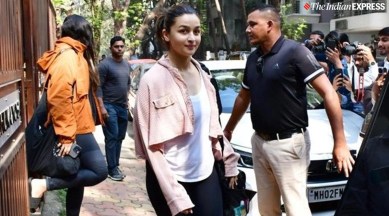Click here to follow Screen Digital on YouTube and stay updated with the latest from the world of cinema.

Women become aware of the male gaze early on. We internalise the fact that we are being watched, objectified, sexualised, judged or even mentally preyed on or violated by men on a daily basis. It’s no surprise then that Alia Bhatt was immediately aware of someone staring at her and violating her personal space as she sat on her balcony.
The photographers had reportedly positioned themselves on the terrace of a building opposite Alia’s and were clicking her pictures using a telephoto lens. They then proceeded to share these pictures on Instagram with a watermark but without Alia’s permission and tried to make it look like they had captured a candid moment. Not surprisingly Alia shared the pictures, tagged the Mumbai Police and expressed her outrage at the incident. She wrote in her Insta story, “In what world is this okay and allowed? This is a gross invasion of someone’s privacy! There’s a line you just cannot cross and it’s safe to say all lines were crossed today!” Earlier, photographers had clicked Anushka Sharma and Virat Kohli’s pictures as they sat on their balcony.
It’s a classic case of creating a Frankenstein monster, where being dependent on the paparazzi for publicity often leaves celebrities incapable of criticising them, even when their behaviour is unacceptable.
Anushka has now voiced support for Alia along with Karan Johar, Arjun Kapoor and many other celebrities. What started off perhaps as the Page 3 culture in India, has now devolved into a 24/7 circus where the paparazzi follow celebrities everywhere.
Social media, easily available internet and phones with cameras have only enabled people and the paparazzi further. So now there are unseen videos, leaked videos, blurry zoomed in pictures of stars and a growing sense of entitlement amongst members of the public as well. In order to stay loved, stars are supposed to pose for pictures, shake hands, and agree to hugs or even a kiss if a fan demands it. Stars who are unable to or refuse to pose for pictures on any occasion, often end up being trolled on social media platforms.
Consider what happened to poor Aditya Roy Kapur who had to deal with a woman forcibly trying to kiss him. Reacting to the incident Aditya said, ” It was just something I had to handle at the moment. She was strong, let’s put it like that, so I did have to handle it…”
Aditya is not alone. Ranbir Kapoor was promoting his upcoming film when a fan ran onto the stage and forcibly hugged him. Though security stepped in immediately, it makes one shudder to think what would happen if a female actor got similarly attacked by male fans.
Akshay Kumar was promoting his film Selfiee when a fan jumped the security barricade and tried to hug him. Security tackled him immediately, but Kumar offered him a quick hug before moving on. Popular playback singer Sonu Nigam, two of his associates and members of his security team were all manhandled by a Shiv Sena MLA’s son who was angered about not being able to take pictures with the singer.
Multiple violations of privacy both by the media and the fans force us to ask some difficult questions.
1. Do celebrities have the right to privacy or does being famous mean becoming an all-day buffet where people can consume you any time they want?
2. If a celebrity calls paparazzi to a location for PR purposes, does that give the photographers a right to click pictures of the celebrity without their permission as well?
3. Do we now need written laws or guidelines about how paparazzi need to behave with celebrities? Do they need to sit down together and come up with rules on how or when their pictures can be clicked?
4. If a photographer or a fan tries to forcibly click pictures or attempt physical contact that violates a celebrity’s personal space, can action be taken by the offender?
Celebrities and paparazzi both need each other, but one can’t be so desensitised that you don’t think twice before making someone feel unsafe or watched in their own home. Most celebrities always cooperate and pose for pictures while entering and exiting airports, parties and award shows. Then why jump over walls, hide in bushes, or keep stalking them with telephoto lenses in this predatory manner?
While celebrities need to stay in the public eye, keeping an eye on them all the time and without their knowledge is unacceptable. Alia’s experience is perhaps a reminder to the paparazzi to set boundaries for themselves and realise that if stars come together and refuse to pose for them, the loss is entirely theirs. They still have their social media accounts and the resources to organise photoshoots in a safe environment at home or in a studio. Hopefully they will ‘scoop’ up this mess and avoid such a self-inflicted disaster again.
Click here to follow Screen Digital on YouTube and stay updated with the latest from the world of cinema.